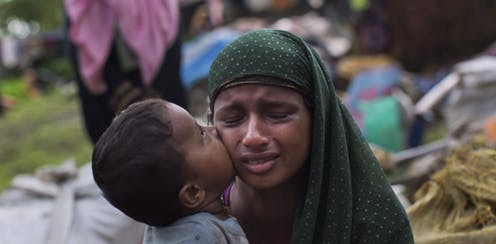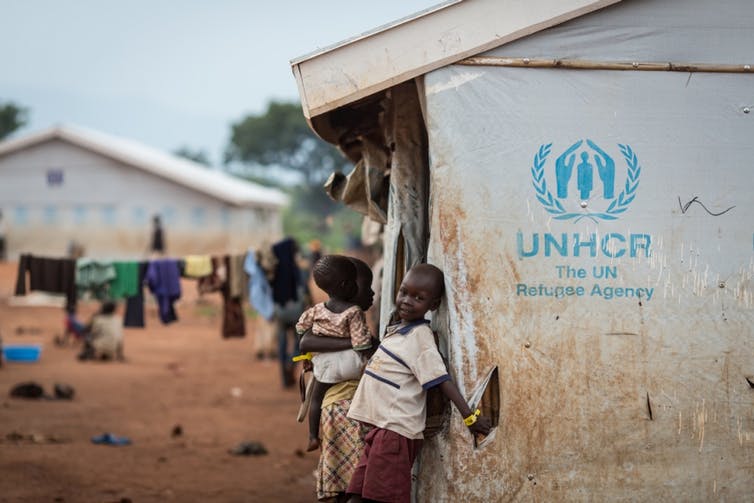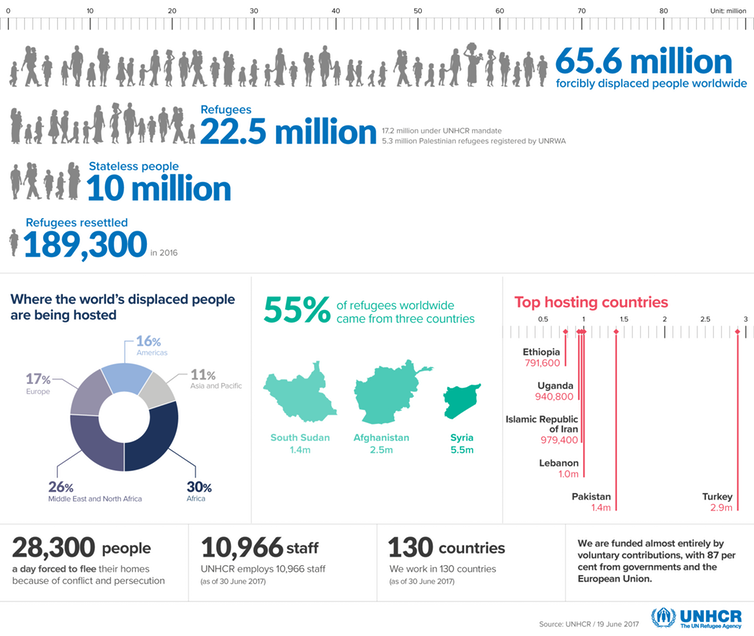The trouble with impunity: War crimes and a humanitarian agency
Didem Doğar, The Conversation, April 22, 2018
Imagine
that your country is at war; you fight and believe that what you are doing is
the right thing to do. But then one day you need to flee, because either
opposition or government forces have decided that you are no longer needed and
should be silenced or eliminated.
that your country is at war; you fight and believe that what you are doing is
the right thing to do. But then one day you need to flee, because either
opposition or government forces have decided that you are no longer needed and
should be silenced or eliminated.
 |
| A Rohingya Muslim child kisses his mother after they fled Myanmar for Bangladesh in September 2017. Thousands of Rohingya Muslims have fled their country for places like Malaysia and Thailand, where a UN agency assesses their refugee claims. But can the UNHCR unwittingly cause countries to neglect investigating war crimes? (AP Photo/Bernat Armangue) |
You flee
and seek asylum in host states. Then their authorities tell you that “you were
in the army, might have committed war crimes, so we need to investigate what
you did in the army.”
At the
end of this process, they have serious suspicions that you had committed war
crimes back in your country. What happens to you next?
end of this process, they have serious suspicions that you had committed war
crimes back in your country. What happens to you next?
This
scenario frequently occurs when states conduct what’s known as refugee status
determination procedures to decide who is a refugee. Here is the challenge:
There are well-founded suspicions that you committed a crime as you fought for
your country, but can you be tried for that crime?
scenario frequently occurs when states conduct what’s known as refugee status
determination procedures to decide who is a refugee. Here is the challenge:
There are well-founded suspicions that you committed a crime as you fought for
your country, but can you be tried for that crime?
This is
often not a viable option considering that you’re a foreigner and suspected of
a crime committed far away. Gathering evidence would be a daunting task for
host states. If a criminal trial is not an option, this puts the problem of
what’s known as impunity front and centre.
often not a viable option considering that you’re a foreigner and suspected of
a crime committed far away. Gathering evidence would be a daunting task for
host states. If a criminal trial is not an option, this puts the problem of
what’s known as impunity front and centre.
What is
impunity?
impunity?
According
to the United Nations,
impunity occurs when states fail to meet their obligations to investigate human
rights violations and do not take the appropriate steps to ensure suspects are
prosecuted, tried and punished.
to the United Nations,
impunity occurs when states fail to meet their obligations to investigate human
rights violations and do not take the appropriate steps to ensure suspects are
prosecuted, tried and punished.
In short,
impunity arises when states neglect to bring suspects of human rights
violations to justice.
impunity arises when states neglect to bring suspects of human rights
violations to justice.
We often
view states as being primarily responsible for preventing impunity. But could a
humanitarian agency, like the United Nations High Commissioner for Refugees
(UNHCR), be causing impunity because it’s doing its job? Could it cause states
to fail to investigate human rights violations? Let’s examine:
view states as being primarily responsible for preventing impunity. But could a
humanitarian agency, like the United Nations High Commissioner for Refugees
(UNHCR), be causing impunity because it’s doing its job? Could it cause states
to fail to investigate human rights violations? Let’s examine:
The 1951 Refugee
Convention is an international legal document that defines who is a
refugee. Normally, states have the main responsibility to determine the status
of asylum seekers, but the UNHCR intervenes only if “states are
unable or unwilling” to do so.
Convention is an international legal document that defines who is a
refugee. Normally, states have the main responsibility to determine the status
of asylum seekers, but the UNHCR intervenes only if “states are
unable or unwilling” to do so.
In 2013,
the UNHCR was responsible for assessing and
dismissing refugee claims in more than 50 countries, including in
Thailand and Malaysia, which receive the most asylum-seekers in Southeast Asia.
the UNHCR was responsible for assessing and
dismissing refugee claims in more than 50 countries, including in
Thailand and Malaysia, which receive the most asylum-seekers in Southeast Asia.
 |
|
Sudanese
refugees are seen at this centre in Uganda. UNHCR |
As a part
of the procedure to assess refugee claims, the UNHCR is entitled to
exclude asylum-seekers from international protection if they are
suspected of committing war crimes, crimes against humanity and serious
non-political crimes, including torture, in a process called exclusion
assessment.
Here’s
the problem: The UNHCR may have
excellent access to information concerning criminal acts through
contact with suspects, victims or witnesses, particularly during the exclusion
assessment. Some of these acts, including war crimes and torture, require
countries where the UNHCR assesses refugee claims to launch criminal
investigations into suspects.
the problem: The UNHCR may have
excellent access to information concerning criminal acts through
contact with suspects, victims or witnesses, particularly during the exclusion
assessment. Some of these acts, including war crimes and torture, require
countries where the UNHCR assesses refugee claims to launch criminal
investigations into suspects.
However,
the UNHCR also maintains a high degree
of confidentiality concerning information provided by refugees. Now,
if the UNHCR does not share information about possible criminal acts, how would
states investigate human rights violations?
the UNHCR also maintains a high degree
of confidentiality concerning information provided by refugees. Now,
if the UNHCR does not share information about possible criminal acts, how would
states investigate human rights violations?
There is
no transparency from the UNHCR. We simply do not know how many people were
excluded from protection because of serious criminality. How grave were their
suspected crimes? What does UNHCR do with the information that it gathers?
no transparency from the UNHCR. We simply do not know how many people were
excluded from protection because of serious criminality. How grave were their
suspected crimes? What does UNHCR do with the information that it gathers?
Some
European countries, including the Netherlands,
the United Kingdom and Denmark, maintain the information flow
between their immigration departments and their respective justice departments
to prosecute those denied refugee status because of serious criminality.
European countries, including the Netherlands,
the United Kingdom and Denmark, maintain the information flow
between their immigration departments and their respective justice departments
to prosecute those denied refugee status because of serious criminality.
Transparency
needed
needed
Although
I don’t support such a practice, why does the UNHCR fail to provide very basic
information such as numbers? It also refuses to
answer questions on the matter.
I don’t support such a practice, why does the UNHCR fail to provide very basic
information such as numbers? It also refuses to
answer questions on the matter.
Today
there are more than 17
million refugees in the world under the UNHCR’s protection. There
are almost 70 countries, including Lebanon, Jordan, Malaysia and Egypt, in
which the UNHCR decides who is going to be excluded from protection on the
basis of serious criminality.
there are more than 17
million refugees in the world under the UNHCR’s protection. There
are almost 70 countries, including Lebanon, Jordan, Malaysia and Egypt, in
which the UNHCR decides who is going to be excluded from protection on the
basis of serious criminality.
 |
|
The
UNHCR’s figures on refugees at a glance. UNHCR |
The UNHCR
therefore assesses the refugee claims of a great number of people. Considering
these large numbers, we need to discuss the UNHCR’s role in impunity when it
fails to share the information concerning suspected criminal acts.
therefore assesses the refugee claims of a great number of people. Considering
these large numbers, we need to discuss the UNHCR’s role in impunity when it
fails to share the information concerning suspected criminal acts.
Having
said that, putting all responsibility on the UNHCR creates too large a burden
for a humanitarian agency to carry.
said that, putting all responsibility on the UNHCR creates too large a burden
for a humanitarian agency to carry.
In a
world where more than 65
million people are displaced and nearly 23 million
people are refugees, the UNCHR’s humanitarian efforts are invaluable
and necessary. The organization is carefully working to help refugees at large
on a very small budget and with scant resources.
world where more than 65
million people are displaced and nearly 23 million
people are refugees, the UNCHR’s humanitarian efforts are invaluable
and necessary. The organization is carefully working to help refugees at large
on a very small budget and with scant resources.
But the
UNHCR is a part of the United Nations family. If the UN cannot achieve unity
and commitment to stop impunity among its agencies, how can it possibly
convince member states to do the same thing?
UNHCR is a part of the United Nations family. If the UN cannot achieve unity
and commitment to stop impunity among its agencies, how can it possibly
convince member states to do the same thing?


